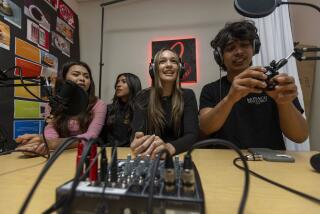Successes Speak Well for Debate Coach
- Share via
UNION CITY, Calif. — Logan High School forensics coach Tommie Lindsey’s classroom says a thing or two about his success: It’s crowded with banners, trophies and kids.
On this morning, Lindsey is just minutes from loading 38 high school students into buses and heading to Long Beach, where they will compete in the Jock Howe Invitational. More than 60 schools from across the nation would participate in the three-day forensics challenge, competing in public speaking, presentation and debate. The Logan High team would take the grand sweepstakes award as well as six individual first-place awards.
Lindsey, a 15-year teacher at the Bay Area school, was recently named one of 23 recipients of the MacArthur Foundation’s annual $500,000 award -- a so-called “genius grant” the foundation disburses over a five-year period with no strings attached. Meant to underscore “the importance of a creative individual in society,” according to the foundation, “fellows are selected for their originality, creativity, and the potential to do more in the future.”
Recipients of the grants are nominated anonymously, but Lindsey’s qualifications are obvious. Logan High, a public school in a middle- to low-income area, has claimed four state forensics titles and many other awards in a type of academic competition usually more suited for prep schools than public schools. Typically, the 16 forensic categories include speech, interpretation and acting.
Lindsey, 53, a Mississippi transplant, is known for his dedication. He usually works seven days and up to 150 hours a week. If he’s not practicing with the 300-plus-member team -- most schools have about 40 members and as many as eight coaches -- he’s attending weekend tournaments from 6 a.m. to 11 p.m.
“I think every teacher does a lot,” said Alphonso Thompson, Lindsey’s substitute teacher and former student, “but what Lindsey does goes above and beyond the call of duty a million times over. I don’t know where I would be if it wasn’t for Mr. Lindsey.”
He has had numerous offers, mostly from private schools, to bring his expertise, and his assistant coach, Tim Campbell, elsewhere, and says he has entertained some of those offers seriously, especially since learning that the program’s funding for next year is threatened. For now, Lindsey is still at Logan, where he has taught public speaking and debate to about 3,000 students, many of them from poor and/or single-parent homes.
When Lindsey started at Logan in 1989 there were many skeptics.
“Even the principal didn’t think we would be able to do forensics at Logan,” he said. So Lindsey began recruiting athletes, whom he believed would take to competition.
“I went out and started getting athletes and putting them to the challenge. I would say, ‘I don’t think you can do this.’ ... Finally, they would come out and find that they love it.”
It’s that mix of tough love, confidence and intuition that makes Lindsey both a friend and a foe. But most of all, it’s what sparks his students.
Varun Mitra, a senior at Logan, started on the team as a freshman. “Mr. Lindsey sacrifices a lot,” Mitra said. “He never gives up on you if you say no to him.... He’ll keep going after you to the point where you realize he was right, until he molds you into a better life.”
Before forensics, Mitra had planned to go to a University of California campus because his parents encouraged it. Now, he has even grander plans: after a bachelor’s degree, law school.
“Four years ago when I came in, I wasn’t able to speak in front of anyone.... This program made me want to pursue a career in public speaking -- as a lawyer, in politics,” he said. “This program has helped me decide what I want to do in life.”
Not all of Logan’s students fit the typical mold for a forensics team, however. Many have been diagnosed with learning disabilities; others have never made academics their focus. And half the team members are female, still somewhat unusual in forensics.
But what really sets Lindsey’s program apart is that its popularity has made being smart cool, mainly because the students see each other getting good grades.
“When you join the program it creates expectations that you’re going to further your education in college,” said Mike Joshi, a senior. He plans to apply to several Ivy League colleges this year.
“There are kids in honors classes that need the intellectual outlet,” Lindsey said, “but many of the kids may not fit into standard academics. Some have been labeled special ed, and they come in and we find a place for them.... It’s a matter of believing in a kid and finding a special something the kid does.”
It’s also about pushing students to do what they never thought possible: More than 90% of them go on to attend college.
“I presently have a kid living in a two-bedroom apartment with five people. He sleeps on the couch.... But he wants to be able to do forensics, because it’s an outlet,” Lindsey said. “Once you’re involved in this group, you start thinking about four-year colleges. Not if, but when.”
Lindsey moved to west Oakland as a child and graduated from Castelmont High School. He received a bachelor of arts degree from the University of San Francisco -- where he was the school’s first African American valedictorian -- and went on to get a bachelor of science degree and secondary teaching certificate there.
Lindsey then went to law school for a year and simultaneously began teaching to “pay the bills.” He was hooked, and after five years teaching at Alameda County’s Juvenile Hall, Lindsey landed a full-time teaching job at El Rancho Verde High School, where he stayed until moving to Logan.
He is the father of two Logan students -- Terrence, a junior at the school, and Erica, 21, now a student at UCLA.
It was his children he thought of first when he was awarded the grant last month, he said. “With this money, we’re finally going to get some relief here. Most important is my daughter and son’s educations.”
That help is well-deserved, say Lindsey’s colleagues and students, who are pleased that the money is for him alone.
Lindsey said he was surprised and happy when he got the call. “It’s great, not just because I was honored, but because teachers are not respected as they should be. Teaching changes lives and builds kids up.... They should be given more recognition than they receive,” he said. “I was so happy the MacArthur Foundation is now looking at public school teachers, because it’s very different. You have to be loyal to work in a public setting. I was shocked, and very appreciative.”
Lindsey said he ended up in forensics because he was always fascinated by oration -- including listening as a child to sermons at the Baptist churches he attended and to civil rights speeches by the Rev. Martin Luther King Jr. While in high school, Lindsey decided he wanted to speak at the graduation ceremony.
Though his teacher doubted him, she said he could try, then handed him his topic: “Investing in Learning to Cultivate the Intellect.”
After his initial frustration melted away, Lindsey sat down with a neighbor and hashed out a speech -- one that got him a standing ovation at the ceremony.
“I took that negative energy and propelled it,” he said, adding that he still looks after that neighbor, who is now 102.
The students at Logan are not the only ones to gain something, however.
Logan journalism teacher Patrick Hannigan said: “At the end of my career, what I will remember is that I worked with Tommie Lindsey.”
More to Read
Sign up for Essential California
The most important California stories and recommendations in your inbox every morning.
You may occasionally receive promotional content from the Los Angeles Times.













